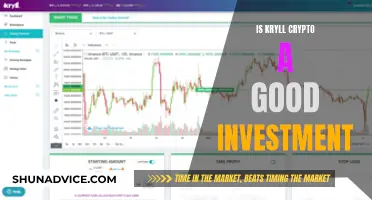
Bitcoin is a decentralised digital currency that can be bought, sold, and exchanged without using an intermediary such as a bank. It is a mode of exchange, a currency, and a store of value or an alternative investment. In India, investors can buy Bitcoin using Indian Rupees with a minimum capital of Rs. 100. However, this limit may vary depending on the specific crypto exchange.
While Bitcoin offers investors an additional option for diversifying their portfolio, they need to be mindful of the volatility of the cryptocurrency. It is a high-risk, high-reward investment.
| Characteristics | Values |
|---|---|
| Legality | Legal in India |
| Minimum Investment | No minimum amount to buy BTC in India, but investors can buy from Rs.100 |
| Payment Options | Bank transfers, net banking, Mobikwik, cryptocurrency wallet, UPI |
| Storage Options | Hot wallets, cold wallets |
| Taxation | 30% tax on crypto transactions' capital gains, 1% Tax Deducted at Source (TDS) |
| Risk | High volatility, not suitable for ethical investors |
What You'll Learn

How to buy Bitcoin in India
Step 1: Choose a Crypto Exchange
You will need a crypto exchange to buy Bitcoin or any other cryptocurrency. A crypto exchange is a platform where buyers and sellers meet to exchange dollars for coins. There are hundreds of exchanges out there, but as a beginner, you will want to opt for one that balances ease of use with low fees and high security. Some of the top crypto exchanges in India are CoinDCX, Mudrex, Unocoin, ZebPay, and WazirX.
Step 2: Set up an account
Before you can use the crypto exchange platform, you will need to open an account and verify your identification. You will need to provide personal information to the service to create an account. Remember to choose an exchange with a user-friendly interface and extensive support for BTC trading pairs. In addition, look out for considerate trading fees.
Step 3: Fund your account
After choosing an exchange, you must fund your account before you can begin investing in Bitcoin. Depending on the exchange, you can fund your account through bank transfers, net banking, Mobikwik, a cryptocurrency wallet, or UPI. Remember that platforms may charge higher transaction fees for specific funding options. For example, CoinDCX doesn't charge a fee if you use UPI and bank transfers, but it charges 0.5% on net banking.
Step 4: Place an order
Once your account is funded, you can place your first order to buy Bitcoin. Depending on the platform, you may be able to purchase it by tapping a button or entering Bitcoin's ticker symbol (BTC) and the amount you want to invest.
Step 5: Store your Bitcoin
The crypto exchange you use will probably have an integrated Bitcoin wallet or a preferred partner where you can safely hold your Bitcoin. If you want to explore other options, you can store your Bitcoin in an online or offline wallet. However, remember that if you move crypto off of an exchange, you may have to pay a small withdrawal fee, and you will be responsible for safeguarding your private key.
The Ultimate Guide to Investing in Bitcoin Shares
You may want to see also

Bitcoin's value and volatility
Bitcoins Value and Volatility
Bitcoin is a decentralised digital currency that can be bought, sold, and exchanged without using an intermediary such as a bank. It is a mode of exchange, a currency, and a store of value or an alternative investment.
Bitcoin's value is determined by supply and demand in the market. However, its price is extremely volatile. In fact, the volatility of Bitcoin prices is almost 10 times higher than the volatility of major exchange rates (US dollar against the euro and the yen).
Bitcoin's price is heavily influenced by supply and demand. Bitcoin's market value is affected by how many coins are in circulation and how much people are willing to pay. By design, the cryptocurrency is limited to 21 million coins—the closer the circulating supply gets to this limit, the higher prices are likely to climb.
Media outlets, influencers, opinionated industry moguls, and well-known cryptocurrency fans create investor concerns, leading to price fluctuations. Fear and greed are two primary drivers behind Bitcoin's volatility and prices. Because of its well-known volatility, investors fear that they will miss out on big upswings or fall victim to large downswings. This causes many of them to panic sell or buy, influencing demand and, therefore, prices.
Bitcoin's price is also influenced by varying beliefs in its utility as a store of value and method of value transfer. Many investors believe that Bitcoin will retain its value and continue growing, using it as a hedge against inflation and an alternative to traditional value stores like gold or other metals.
Government agency views of cryptocurrency can also affect Bitcoin's price. For example, the Internal Revenue Service (IRS) considers Bitcoin a convertible virtual currency because you can convert it to cash. The IRS also considers Bitcoin a capital asset if it's used as an investment instrument.
In addition, the price of Bitcoin is influenced by the actions of large investors or "whales". It is unclear how investors with large holdings would liquidate their positions without affecting Bitcoin's market price. If these whales were to begin selling their Bitcoin holdings suddenly, prices would plummet as other investors panicked and followed suit.
Bitcoin's price fluctuates because it is influenced by supply and demand, investor and user sentiments, government regulations, and media hype. All of these factors work together to create price volatility.
The Bitcoin Business: A Guide to Investing
You may want to see also

Bitcoin wallets and storage
Bitcoin wallets are like online bank accounts where you can keep your bitcoins safe. They come in the form of a device (hardware), an app, or a website. There are several types of Bitcoin wallets, each with its own pros and cons. Here are some of the most popular Bitcoin wallets in India:
Mobile Wallets:
Mobile Bitcoin wallets are apps that can be downloaded from Google Play or the Apple Store. They are convenient for making small payments or daily purchases. However, their security depends on your smartphone's security, so if your phone is hacked, your wallet may be compromised.
Web Wallets:
Web Bitcoin wallets store your private keys on their servers. Crypto exchanges that offer accounts or wallets are a type of web wallet. While they are easily accessible, the risk lies in the organisation controlling the servers and exchanges. If they shut down or gain access to your private keys, your funds may be at risk.
Desktop Wallets:
Desktop wallets store your private keys on your PC's hard drive, offering more security than mobile and web wallets. The only risk is if someone hacks your PC when you are connected to the internet.
Hardware Wallets:
Hardware wallets, such as the Ledger Nano S Plus and Trezor Model T, are considered the most secure way to store your bitcoins. They are usually in the form of external devices like USB sticks, keeping the private keys offline and away from hackers. They often require physical buttons or passcodes to confirm transactions, adding an extra layer of security. However, they can be more complex to set up and are typically more expensive.
When choosing a Bitcoin wallet, consider factors such as the type of cryptocurrencies supported, security features, convenience, and customer support. Additionally, assess your transaction requirements to determine if you need instantaneous access or prefer greater security with hardware wallets.
Gold Coins: Smart Investment or Risky Business?
You may want to see also

Bitcoin's legality in India
Bitcoin is a cryptocurrency, a digital asset that can be used as a medium of exchange. It is not tied to any bank or government and allows users to spend money anonymously. Bitcoin is a decentralised digital currency, meaning it can be bought, sold and exchanged without using an intermediary such as a bank.
In India, Bitcoin is not illegal. However, it is also not considered legal tender. In 2020, the Supreme Court of India lifted the Reserve Bank of India's (RBI) ban on cryptocurrency, allowing its trade on domestic exchanges. There is no law prohibiting Indians from buying or selling Bitcoin, and it is recognised as a legal investment option. However, there is a lack of clarity over the tax status of cryptocurrencies, and investors should be aware of potential capital gains taxes.
While the Indian government has been open to the idea of introducing a central bank digital currency (CBDC), it has maintained a staunch opposition to private cryptocurrencies. A proposed bill, the Cryptocurrency and Regulation of Official Digital Currency Bill, aims to prohibit all private cryptocurrencies in India, with certain exceptions to promote the underlying technology. As of February 2022, this bill had not been approved by India's parliament, leaving the legislative status of cryptocurrencies in the country unclear.
Despite the lack of legal tender status and regulatory uncertainty, Bitcoin and other cryptocurrencies are gaining popularity in India due to factors such as inherent security, lower transaction fees, and easy access and use. However, it is important to note that investing in cryptocurrencies carries risks, including price volatility and the potential for hacking or other illegal activities.
The Tax Implications of Bitcoin Investments
You may want to see also

Alternative ways to invest in Bitcoin
Investing in Bitcoin can be done in a few different ways, each with its own advantages and drawbacks. Here are some alternative ways to invest in Bitcoin:
- Cryptocurrency Exchange Platforms: These platforms, such as CoinDCX, CoinSwitch, Mudrex, and WazirX in India, allow users to buy, sell, and trade cryptocurrencies. They offer varying levels of security, liquidity, and trading pairs. Some platforms may charge fees for certain funding options, so it's important to review their fee structures before choosing an exchange.
- Robinhood App: Robinhood is a broad investment app that offers users the opportunity to invest in cryptocurrencies like Bitcoin and Ethereum Classic. It is suitable for investing in specific crypto assets but not for using them to purchase goods and services.
- Bitcoin Exchange: A full-service cryptocurrency firm like Coinbase allows users to buy, sell, and store cryptocurrencies. Coinbase offers a large base of available crypto assets, educational resources, and a digital wallet for secure storage. However, it has been known to charge higher fees than some competitors.
- Blockchain ETFs: These exchange-traded funds (ETFs) invest in companies that develop and utilise blockchain technology. They also track the performance of Bitcoin or other cryptocurrencies through futures contracts or direct ownership. Examples include the Amplify Transformation Data Sharing ETF, Reality Shares Nasdaq NexGen Economy ETF, and First Trust Index Innovative Transaction & Process ETF.
- Grayscale Bitcoin Trust: This investment fund enables investors to invest in Bitcoin through a traditional fund structure. The shares of this fund trade under the symbol GBTC and can be purchased through brokerage accounts.
- Crypto and Blockchain Industry-Focused ETFs: ETFs like Siren NASDAQ NexGen Economy (BCLN), Bitwise Crypto Industry Innovators (BITQ), and Capital Link NextGen Protocol ETF (KOIN) offer indirect exposure to Bitcoin and the broader crypto industry.
- Decentralized Exchanges: Platforms like Exodus and Bisq allow users to connect directly with third-party buyers and sellers. While these exchanges offer more control and privacy, they may have higher fees and limited cryptocurrency selections.
- Automated Trading: Applications or trading bots, such as Cryptohopper, utilise algorithms to make trades based on market conditions. This strategy can be risky, but it allows investors to take advantage of small price fluctuations.
- Futures and Derivatives: Bitcoin futures, like futures of other commodities, are derivatives with Bitcoin as the underlying security. Derivatives are typically riskier than investing directly, and Bitcoin futures are no exception. Cryptocurrency futures, in particular, carry significant risk due to the volatile nature of the underlying asset.
- Blockchain Technology and Crypto Mining Companies: Instead of investing directly in Bitcoin, consider investing in companies that develop blockchain technology or mine cryptocurrencies. These companies often offer stocks that can be purchased through traditional brokerage accounts.
It is important to note that investing in Bitcoin and other cryptocurrencies carries significant risk due to their volatile nature. Before investing, individuals should educate themselves about the market, perform comprehensive research, and only invest what they can afford to lose.
Bitcoin for Everyone? Exploring Average Joe's Investment
You may want to see also
Frequently asked questions
Yes, it is legal to buy Bitcoin in India. The Supreme Court of India lifted the RBI's restrictions on cryptocurrencies in 2020.
There is no minimum investment amount for Bitcoin in India. However, investors can buy small units of Bitcoin if they don't want to purchase an entire cryptocurrency.
You can store Bitcoin in a hot or cold wallet. Hot wallets are connected to the internet and can be accessed online, while cold wallets store your private keys offline and do not store information digitally.
Bitcoin is a very volatile investment and is not suitable for those with a low-risk appetite. Additionally, investors could be exposed to security risks and scams, and the mining of Bitcoins has environmental implications.







